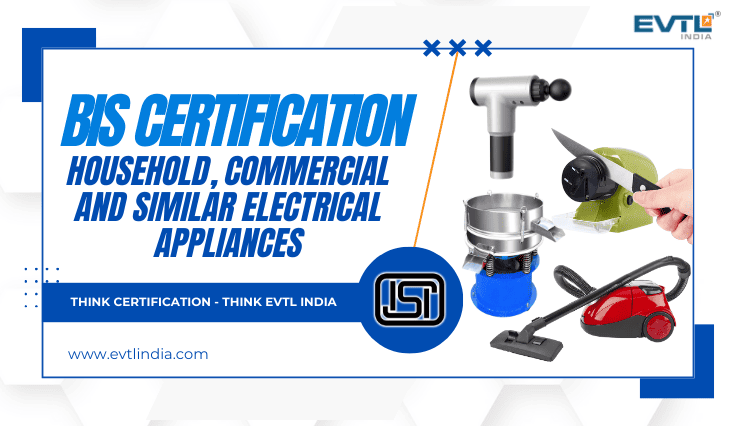The Safety of Household, Commercial, and Similar Electrical Appliances
(Quality Control) Order, 2025, issued by the Bureau of Indian Standards
(BIS), mandates BIS certification for home appliances such as vacuum cleaners,
electric knives, tumbler dryers, cooking ranges, ovens, and similar electrical
devices. To be sold in the Indian market, these appliances must comply with Indian Standard IS 302 (Part 1): 2024.
Manufacturers can obtain the ISI Mark
for Electrical Home Appliances to ensure compliance and remain competitive
in the market.
The ISI Mark issued by BIS assures
that the labeled item adheres to stringent safety and quality standards,
safeguarding consumer interests and ensuring product reliability.
Why is BIS Certification Necessary for Electrical Appliances?
BIS certification for Household electrical appliances is essential to meet the required safety and quality benchmarks.
Appliances manufactured without adhering to these standards can lead to serious
risks such as fires, electric shocks, or short circuits. By mandating BIS
certification, the government minimizes these hazards, ensuring consumer safety.
Additionally, obtaining the ISI Mark for home appliances builds
consumer trust, as these products undergo rigorous testing to confirm their
safety and reliability. BIS certification also allows manufacturers to
demonstrate their commitment to quality, giving them a competitive edge in the
market.
On May 19, 2025, the Ministry of
Commerce and Industry, through the Department for Promotion of Industry and
Internal Trade (DPIIT), introduced the Safety
of Household, Commercial, and Similar Electrical Appliances (Quality Control)
Order, 2025. This regulation specifies that all electrical appliances
within the voltage ratings of 250V for single-phase AC and 415V for three-phase
AC must comply with IS 302 (Part 1): 2024 and obtain BIS certification.
Overview of IS 302 (Part 1): 2024
The Indian Standard IS 302 (Part 1): 2024 specifies the safety requirements for household and commercial electrical appliances. It provides guidelines for the design, construction, and performance of these devices to ensure safe use in everyday environments. Key safety features include effective insulation, prevention of electric shocks, and thermal protection.
The safety standard IS 302 (Part 1) has been updated from the 2008 version to IS 302 (Part 1): 2024/IEC 60335-1: 2020. Both versions will run concurrently until February 23, 2026, to facilitate a smooth transition for manufacturers. After February 23, 2026 the standard 302 Part 1:2008 will be suspended and only 302 Part 1:2024 will be operative.
This standard minimizes risks like
overheating, electrical fires, and damage from power fluctuations. Since it
aligns with international safety protocols, products complying with IS 302
(Part 1): 2024 are competitive globally while ensuring safety for consumers in
India.
Also Read
Products Covered under IS 302 (Part 1): 2024
BIS Certification Process for Electrical Appliances
The ISI certification for home appliances involves several steps to
verify that products comply with applicable standards:
- Application
Submission: Manufacturers submit the BIS
application form, including technical product details.
- Product Testing:
Samples are tested in BIS-approved laboratories against IS 302 (Part 1):
2024, focusing on safety, performance, and durability.
- Factory Inspection:
BIS officials inspect the manufacturing facility to assess production
processes and quality control systems.
- Evaluation of Test Reports: BIS evaluates the lab test results. Products meeting all
standards are approved for certification.
- Grant of License:
Upon approval, the BIS license is issued, allowing manufacturers to use
the ISI Mark for electrical home
appliances.
- Surveillance: Post-certification, BIS conducts periodic audits and random
sample testing to ensure continued compliance.
Documents
Required for BIS Certification
The documents
required for BIS certification include:
● Application form
● Manufacturing process details
● Quality control plan
● Test reports from BIS-approved
laboratories
● Factory layout and equipment
details
● Proof of business registration
● Product specifications and
technical details
● Declaration of conformity to
Indian standards
Having these
documents in order is crucial for a smooth certification process. Missing or
incorrect documentation can lead to delays or rejection of the application.
Why
the BIS Quality Control Order (QCO) 2025 Matters?
The introduction of the Safety of Household, Commercial, and
Similar Electrical Appliances (Quality Control) Order, 2025 underscores the
government’s focus on consumer safety and product quality. By enforcing
compliance with IS 302 (Part 1): 2024,
the QCO significantly reduces risks associated with electrical accidents and
ensures the reliability of appliances in the market.
Exemptions and grace periods are
available for small and micro enterprises, providing them with 9 and 12 months,
respectively, to comply with the new regulations. Manufacturers can also import
up to 200 units annually for research and development without requiring
certification, provided the appliances are not sold commercially.
Conclusion:
Navigating the BIS certification for home appliances can be challenging due to
technical requirements, document management, and strict testing protocols. EVTL
India, a leading BIS certification consultant, provides comprehensive support
to manufacturers seeking the ISI Mark
for home appliances or other electrical devices.
From application submission to product
testing and certification, EVTL India’s expert team simplifies the process,
ensuring compliance with the Safety of
Household, Commercial, and Similar Electrical Appliances (Quality Control)
Order, 2025. Whether you’re a small business or a large manufacturer, EVTL
India ensures your products meet all necessary standards, providing a
hassle-free experience and helping you achieve market success.





















